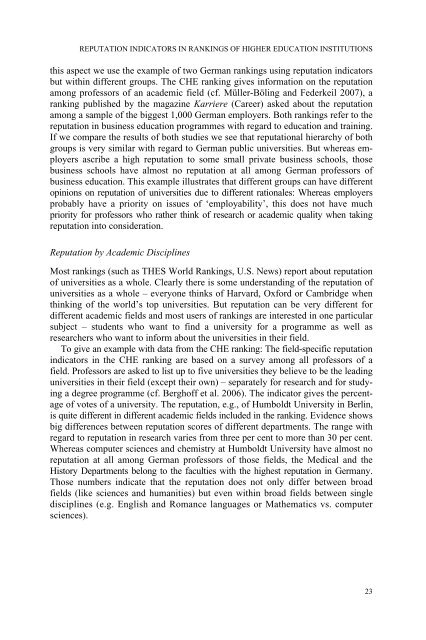University Rankings, Diversity, and the New ... - Sense Publishers
University Rankings, Diversity, and the New ... - Sense Publishers
University Rankings, Diversity, and the New ... - Sense Publishers
You also want an ePaper? Increase the reach of your titles
YUMPU automatically turns print PDFs into web optimized ePapers that Google loves.
REPUTATION INDICATORS IN RANKINGS OF HIGHER EDUCATION INSTITUTIONS<br />
this aspect we use <strong>the</strong> example of two German rankings using reputation indicators<br />
but within different groups. The CHE ranking gives information on <strong>the</strong> reputation<br />
among professors of an academic field (cf. Müller-Böling <strong>and</strong> Federkeil 2007), a<br />
ranking published by <strong>the</strong> magazine Karriere (Career) asked about <strong>the</strong> reputation<br />
among a sample of <strong>the</strong> biggest 1,000 German employers. Both rankings refer to <strong>the</strong><br />
reputation in business education programmes with regard to education <strong>and</strong> training.<br />
If we compare <strong>the</strong> results of both studies we see that reputational hierarchy of both<br />
groups is very similar with regard to German public universities. But whereas employers<br />
ascribe a high reputation to some small private business schools, those<br />
business schools have almost no reputation at all among German professors of<br />
business education. This example illustrates that different groups can have different<br />
opinions on reputation of universities due to different rationales: Whereas employers<br />
probably have a priority on issues of ‘employability’, this does not have much<br />
priority for professors who ra<strong>the</strong>r think of research or academic quality when taking<br />
reputation into consideration.<br />
Reputation by Academic Disciplines<br />
Most rankings (such as THES World <strong>Rankings</strong>, U.S. <strong>New</strong>s) report about reputation<br />
of universities as a whole. Clearly <strong>the</strong>re is some underst<strong>and</strong>ing of <strong>the</strong> reputation of<br />
universities as a whole – everyone thinks of Harvard, Oxford or Cambridge when<br />
thinking of <strong>the</strong> world’s top universities. But reputation can be very different for<br />
different academic fields <strong>and</strong> most users of rankings are interested in one particular<br />
subject – students who want to find a university for a programme as well as<br />
researchers who want to inform about <strong>the</strong> universities in <strong>the</strong>ir field.<br />
To give an example with data from <strong>the</strong> CHE ranking: The field-specific reputation<br />
indicators in <strong>the</strong> CHE ranking are based on a survey among all professors of a<br />
field. Professors are asked to list up to five universities <strong>the</strong>y believe to be <strong>the</strong> leading<br />
universities in <strong>the</strong>ir field (except <strong>the</strong>ir own) – separately for research <strong>and</strong> for studying<br />
a degree programme (cf. Berghoff et al. 2006). The indicator gives <strong>the</strong> percentage<br />
of votes of a university. The reputation, e.g., of Humboldt <strong>University</strong> in Berlin,<br />
is quite different in different academic fields included in <strong>the</strong> ranking. Evidence shows<br />
big differences between reputation scores of different departments. The range with<br />
regard to reputation in research varies from three per cent to more than 30 per cent.<br />
Whereas computer sciences <strong>and</strong> chemistry at Humboldt <strong>University</strong> have almost no<br />
reputation at all among German professors of those fields, <strong>the</strong> Medical <strong>and</strong> <strong>the</strong><br />
History Departments belong to <strong>the</strong> faculties with <strong>the</strong> highest reputation in Germany.<br />
Those numbers indicate that <strong>the</strong> reputation does not only differ between broad<br />
fields (like sciences <strong>and</strong> humanities) but even within broad fields between single<br />
disciplines (e.g. English <strong>and</strong> Romance languages or Ma<strong>the</strong>matics vs. computer<br />
sciences).<br />
23














